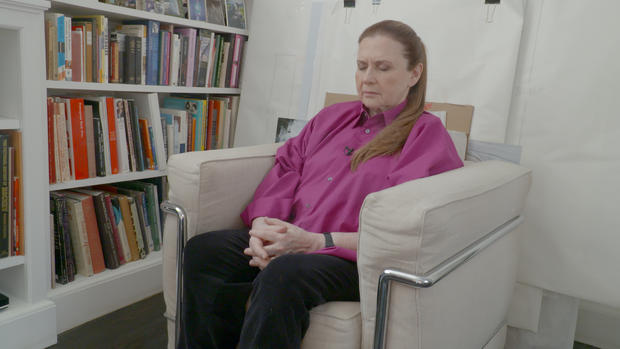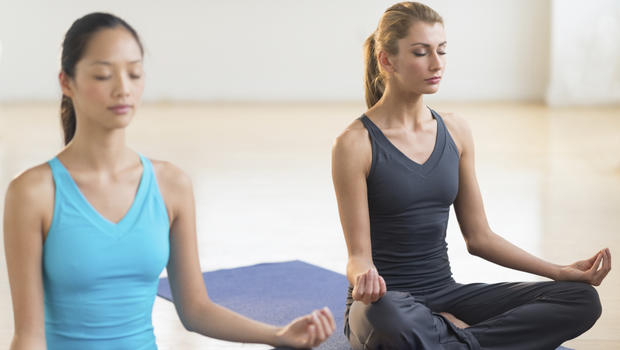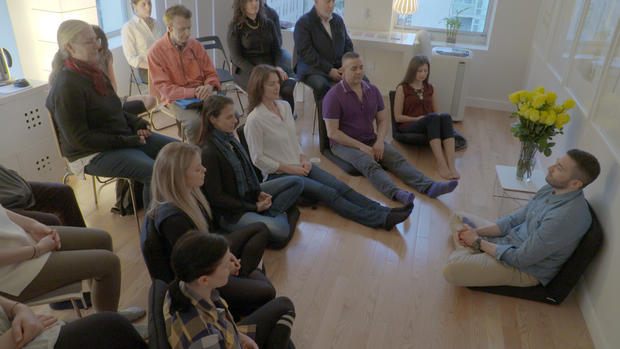Meditation helps retiree find her "encore"
NEW YORK -- Rochelle Udell spent almost 50 years working in the hard-charging worlds of advertising and magazine publishing, with senior positions at places like Vogue and Self. When it came time for her to retire about a year ago, she knew she was going to need some help adjusting.
"This new transition of my life is going to take place, and I need a tool to start to deal with it," said Udelle.
The tool she found was meditation.
"When the time came to retire, I wasn't sure what I was going to face," she told CBS News. "When I woke up the next day and I didn't have the train to get on or a job to go to, I was faced with: 'What kind of conversations am I going to have, with whom, about what?' Meditation gave me a pathway to ask those questions without panic."
She has since moved on to what she calls her "encore" as an artist. Besides helping her find answers to those questions about her life transition, meditation also helped improve aspects of Udell's overall health. She describes herself as naturally anxious person, but meditation has helped her ratchet down her stress, be more patient, and even sleep better, resulting in "more consistent energy."
The 71-year-old used to be a marathon runner, but isn't able to run like she used to. "Meditation has absolutely helped me cope with my body changing," she said. She's now comfortable enjoying long power walks.
Udell's routine consists of meditating for 20 minutes twice a day in the morning and evening. Her husband Doug Turshen does it, too.
They practice Vedic meditation, which consists of sitting with your eyes closed and using a specific sound or mantra to "settle" the mind and body into a restful state.
Udell learned this form of meditation from her son, Ben Turshen, who has been a Vedic meditation teacher in New York for about three years. Turshen's students vary in age, but said about a third of of them are 50 and older. Many are coming to him with high levels of anxiety because of age-related health problems and stress sometimes linked to retirement.
"A lot of people identify with their job and their career and that loss of identity ... they don't have the same purpose that they had while they were in the workforce. So that's one reason. The other reason is that their bodies can no longer do what they used to do, and that always causes some suffering," he said.
Turshin, 35, has helped his students through those anxieties and physical limitations with the practice of meditation. He says he has even seen it make a difference for people coping with chronic joint pain. "We don't lose the sensory perception of the brain, but the way we appreciate that sensation changes. And we no longer appreciate the sensation for something that makes us upset or angry," said Turshen.
The impact meditation may have on physical and mental well-being is attracting the interest of mainstream medicine and researchers at prestigious institutions. Dr. Sara Lazar, a neuroscientist at Massachusetts General Hospital, has been studying meditation and the brain for the past 18 years, and has found that the practice can make a difference as we age.
"There's been numerous studies demonstrating that as we get older our gray matter starts to shrink, so that is why it takes us a little longer to figure things out and we're not quite as sharp as we were when we were younger," Lazar explained. One of her studies found that completing an eight-week mindfulness meditation program resulted in measurable changes to the gray matter in the brain in areas affecting learning, memory and stress management.
"With the non-meditators, their brains were declining with age as expected," she said, whereas in the group of people who meditated in the study, "their rate of decline was much slower than the rate of decline of the non-meditators, suggesting that meditation may help preserve gray matter structure with aging."
Udell appreciates the many ways meditation has made a difference in her life. "Meditation has allowed me to focus very successfully without distraction," she said. "I've used meditation to help me find my next chapter, my place, my encore."



